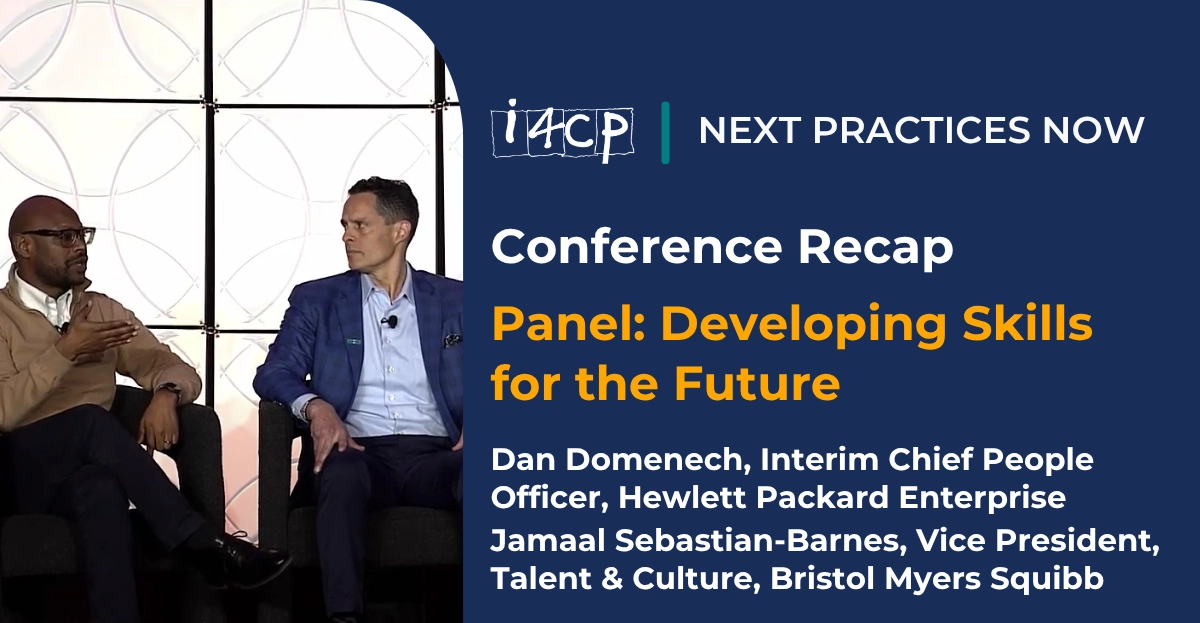Conference Panel Recap: Developing Skills for the Future

Upskilling is a Business Mandate, not an HR Program
At i4cp’s 2025 conference, Dan Domenech and Jamaal Sebastian-Barnes tackled a critical question: how do companies build future-ready skills amid accelerating AI disruption?
The conversation started with urgency. Domenech noted that HPE’s CFO is already counting on a 20% efficiency gain from AI. That’s not a projection. It’s influencing workforce decisions today. Sebastian-Barnes added that at BMS, the stakes are tied directly to the company’s mission. Science is evolving fast, and the workforce has to evolve with it. Training isn’t the point. Empowering people to shift careers in sync with the business is.
Both leaders made clear: this is about resilience. Waiting for disruption to arrive is no longer an option.
Don’t Wait for the Perfect Taxonomy
Both HPE and BMS have invested in skills platforms, but neither waited for a flawless framework. Sebastian-Barnes said BMS started with what they had: job descriptions and applicant data from talent acquisition. That gave them an immediate read on skills supply and demand. AI helped them fill in the gaps, and today more than 80% of the workforce is mapped in the system.
At HPE, employees were asked to self-report skills into Workday. But multiple legacy systems still complicate the picture. Domenech said they rely on Talent DNA to match customer needs with internal expertise, especially in service roles. The challenge now is stitching that data back into a unified system. The message from both leaders was clear: start with usable data, build structure in parallel, and don’t let taxonomy become a bottleneck.
Learning Culture Requires More Than Access
Curiosity is high, but access isn’t always obvious. Sebastian-Barnes shared that BMS employees often said, “I’m curious, but I don’t know where to go.” That insight led to the creation of My Growth, a unified platform that connects employees to gigs, mentors, and learning resources. To make it work, BMS had to retire several siloed systems, even when they were familiar or favored.
At HPE, leadership set the tone. The CEO publicly encouraged all employees to develop a “minor in AI,” which jump-started interest and accountability. In response, HPE launched structured learning journeys tailored to different roles, from general employees to cloud engineers and senior leaders. Still, Domenech acknowledged the cultural headwind: “We’re a successful 60-year-old company. People get complacent.” Tools matter, but so does the willingness to grow.
AI Is Reshaping Roles–and the Way People Learn
AI is changing work faster than traditional learning models can keep up. At BMS, recruiting was an early example. Tasks like scheduling interviews have already been automated. That leaves recruiters with a different job...and a different development need. Sebastian-Barnes stressed that identifying the gap isn’t enough. People also need clear, actionable next steps. Content libraries alone won’t cut it.
HPE is using AI to support leader development through role-play simulations. These scenarios help managers prepare for difficult conversations, boosting both empathy and readiness. Domenech sees this as one way to scale soft-skill development, by making it situational, not generic.
AI may be the disruptor, but it can also be the accelerator–if it’s applied with purpose.
Personalized Learning Still Has to Serve the Business
Employees expect tailored development. Leaders expect results. Balancing the two is where strategy shows up.
At HPE, internal talent marketplaces help define what readiness looks like for strategic roles. Success profiles clarify the expectations. Learning journeys help employees assess whether they’re ready, or close enough to start moving.
BMS takes a similarly focused approach. Rather than try to scale everything at once, they launched pilots in specific business units. HR business partners and skills teams worked together to go deep in high-priority areas. Sebastian-Barnes cautioned against spreading efforts too thin: “You can’t eat the whole elephant.”
The lesson: personalization should enhance focus, not dilute it.
Simulations and Apprenticeships Are Gaining Ground
Both BMS and HPE are finding that non-traditional models often outperform formal programs.
BMS is using simulation tools like Synthesia to create realistic role-plays, especially for field teams. Sebastian-Barnes noted that practicing conversations with virtual doctors builds confidence and nuance in a way static content can’t.
At HPE, apprenticeships are becoming a strategic response to demographic shifts. With a large portion of the workforce nearing retirement, Domenech said they’re identifying critical roles, flagging successors, and using AI to pair people for hands-on learning. These aren’t internships. They’re real work, supported by coaching and AI-driven insights.
Old models, when updated with new tech and tied to strategy, are proving unexpectedly powerful.
From Annual Plans to Always-On Development
Looking ahead to 2028, both leaders expect skill-building to shift from episodic to continuous.
Domenech hopes HPE becomes more predictive than reactive, with learning integrated into daily work, not treated as a separate track. He also pointed to the need for tighter alignment between culture, performance, and development.
Sebastian-Barnes wants to see career planning evolve into a dynamic system: something that updates in real time based on changing roles, motivations, and business needs. He pushed for development that helps people act, not just reflect.
Static development plans won’t survive the pace of change. Continuous, data-driven guidance is the next frontier.
Internal Strategy, External Stakes
In the final moments, i4cp’s Kevin Martin asked how internal talent strategies should connect to broader community impact.
Domenech framed it as a mindset shift. Staying externally focused is why HPE engages with i4cp and similar networks. He pointed to Google’s findings on psychological safety as a moment that changed their internal leadership expectations.
Sebastian-Barnes emphasized transparency. Performing and transforming, as he put it, means being honest, internally and externally, about future needs and how to prepare for them. That includes sharing more than companies typically do.
Upskilling isn’t just a workforce issue. It’s a long-term capability play, and leading organizations are extending their influence beyond company walls.




